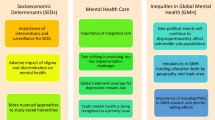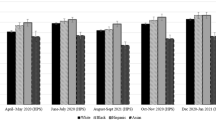Abstract
Assertive Community Treatment (ACT) for people with severe mental illness is an effective approach that is increasingly implemented in rural areas. Low-cost methods of evaluating fidelity to program models are needed to assure services are delivered as intended. In 2007, the Veterans Health Administration implemented an ACT-like Mental Health Intensive Case Management (ACT/ICM) program for SMI veterans in rural areas. This study demonstrates the use of administrative data, reflecting patient characteristics and intensity of service delivery, to characterize services delivered by these programs, to compare them to general mental health programs at the same VA medical centers, and to each other. A total of 298,509 veterans received mental health services at VA medical centers that also operated a rural ACT/ICM program in FY 2012. Altogether 854 (0.29%) received ACT/ICM services for 1 year or more (long term participants) and 259 (.09%) received them for less than 1 year (new entrants). Logistic regression showed ACT/ICM patients were distinguished by diagnoses of schizophrenia, bipolar disorder, and major depression; larger numbers of psychiatric or substance abuse visits; and use of 3 or more classes of psychotropic medication. The model had a high c statistic of 0.91. Propensity scores allowed clear identification of programs most and least conforming to the profile of a “typical” rural ACT/ICM program. Low cost administrative data can be used to identify programs successfully conforming to an empirically derived rural model of ACT/ICM. Further validation of this approach is needed.
Similar content being viewed by others
References
Phillips SD, Burns BJ, Edgar ER, et al. Moving assertive community treatment into standard practice. Psychiatr Serv. Jun 2001;52(6):771–779.
Rollins AL, McGrew JH, Kukla M, et al. Comparison of Assertive Community Treatment Fidelity Assessment Methods: Reliability and Validity. Adm Policy Ment Health. Mar 2016;43(2):157–167.
Teague GB, Bond GR, Drake RE. Program fidelity in assertive community treatment: development and use of a measure. Am J Orthopsychiatry. Apr 1998;68(2):216–232.
Salyers MP, Godfrey JL, Mueser KT, Labriola S. Measuring illness management outcomes: a psychometric study of clinician and consumer rating scales for illness self management and recovery. Community Ment Health J. Oct 2007;43(5):459–480.
Mohamed S. Can small intensive case management teams be as effective as large teams? Community Ment Health J. Feb 2015;51(2):161–164.
Santos AB, Deci PA, Lachance KR, et al. Providing assertive community treatment for severely mentally ill patients in a rural area. Hosp Community Psychiatry. Jan 1993;44(1):34–39.
Rosenheck RA, Seibyl CL. A longitudinal perspective on monitoring outcomes of an innovative program. Psychiatr Serv. Mar 2005;56(3):301–307.
Rosenheck R, Neale M. Cost-effectiveness of intensive psychiatric community care for high users of inpatient services. Arch Gen Psychiatry. May 1998;55(5):459–466.
Mohamed S, Neale M, Castrodonatti J, D’amico M, Rosenheck RA. Rural Acces for growth Enhancment (RANGE) in the Department of Veterans Affairs: first National Performance Monitoring Report: FY 2006. West Haven, CT: Northeast Program Evaluation Center; 2008.
Neale MS, Rosenheck R, Castrodonatti J, Martin A, Morrissey J, D’amico M. Mental Health Intensive Case Management (MHICM): The Tenth National Performance Monitoring Report: FY 2006. West Haven, CT: Northeast Program Evaluation Center; 2007.
Mohamed S, Neale M, Rosenheck RA. VA intensive mental health case management in urban and rural areas: veteran characteristics and service delivery. Psychiatr Serv. Jul 2009;60(7):914–921.
Morrill R., Cromartie J, Hart LG. Metropolitan, urban, and rural communting areas: toward a better depiction of the U.S. settlement system. Urban Geogrqphy. 1999;20(8):727–748.
Charlson ME, Pompei P, Ales KL, MacKenzie CR. A new method of classifying prognostic comorbidity in longitudinal studies: development and validation. J Chronic Dis. 1987;40(5):373–383.
Ferguson CJ. An effect size primer: A guide for clinicians and researchers. Professional Psychology: Research and Practice. 2009;40(5):532.
Author information
Authors and Affiliations
Corresponding author
Rights and permissions
About this article
Cite this article
Mohamed, S. Evaluating the Quality of Rural Intensive Case Management Services using Administrative Data: an Exploratory Study. Psychiatr Q 88, 897–907 (2017). https://doi.org/10.1007/s11126-017-9505-z
Published:
Issue Date:
DOI: https://doi.org/10.1007/s11126-017-9505-z




